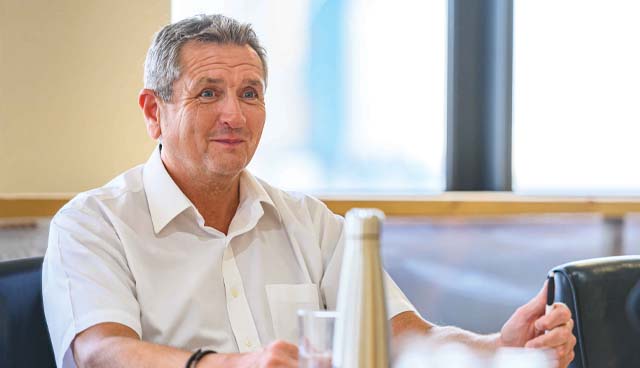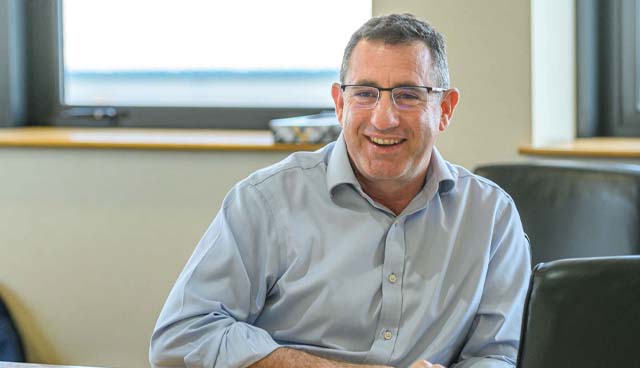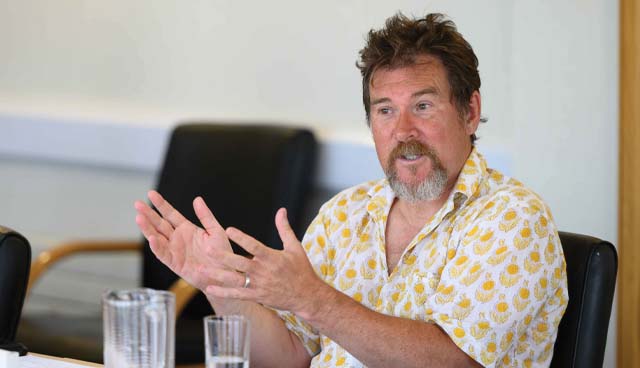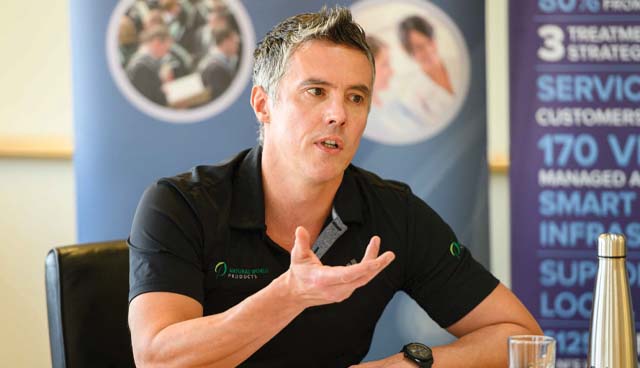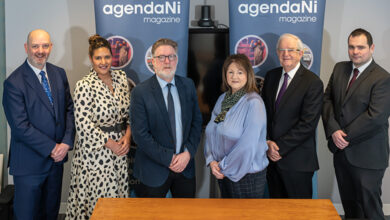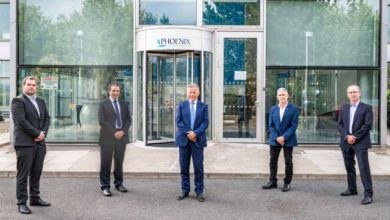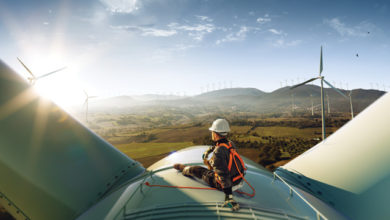Developing a circular economy in Northern Ireland
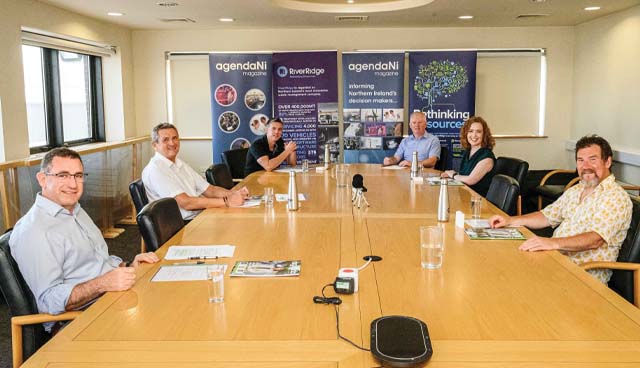
RiverRidge hosted a round table discussion with key stakeholders in the resources (waste) sector around the development of a circular economy in Northern Ireland.
What role does Northern Ireland’s resource industry have in delivering a decarbonised, circular economy?
Brett Ross
The resource sector is in a unique position of interacting with almost every household and business and that is why we have such an important role in decarbonisation. Businesses over the last number of years have moved significantly towards resource efficiency but it has got to a point now where, as long as it goes into a particular bin, it is job done. The waste sector has a role to be a conduit of more information and more data on what is actually happening to the waste being produced, beyond that point. That information and data is what will drive behavioural change over the next 10 to 15 years.
Alan McVicker
A quick analysis of the resource sector and its emissions over the last decade shows two things. Firstly, that the sector is a relatively small player in that regard and secondly, that it has done a lot of good work, particularly in relation to diverting material away from landfill, which is a major source of methane emissions. However, I think there is a big role for the sector around behavioural change. Progress in relation to recycling serves to highlight how the industry can bring the public along in the move to a circular economy.
Colm Warren
I think the greatest impact our sector can have going forward is around education. That goes beyond public campaigns around the environmental benefits of recycling. We have found the area of greatest traction, particularly for politicians and policymakers, is the economic benefits that can flow from a circular economy. For example, organics in your brown bin cost a lot less to dispose of than in your black bin. So, we have sought to highlight those savings that can be made in revenue budgets and encouraged councils to flow these back into their communities through investment (e.g. in parks) and publicly highlight that the investment has been made possible by ratepayers’ behavioural change. I think our sector leaders have a responsibility to help decision-makers better understand the practical implications of a circular economy.
Lisa McIlvenna
Business in the Community work with a range of businesses and, in the past two to three years, we have witnessed a recognisable shift away from companies adopting an insular outlook on their environmental impacts. Previously, organisations broadly concerned themselves with their own numbers and what happened within their own four walls. However, there is a realisation that the climate emergency is no longer about what happens within an organisation, but the entire consequences of operating as an organisation. People can see their wider spheres of influence. Where I think the resource industry has a challenge, and an opportunity, is that many businesses know where they want to get to in terms of environmental impact, but they don’t completely know how to get there. That is where innovation and collaboration is vital. The resource sector can help accelerate Northern Ireland’s shift to a circular economy.
John Barry
We are in a climate emergency, as represented by official declarations of such by the Northern Ireland Assembly, the UK and Irish parliaments and 75 per cent of UK local authorities, and on the back of the pandemic, I think we are experiencing an economic shift. We are moving away from a ‘dig and gig’ economy to a more ‘care and repair’ model. I believe the resource industry and the electricity industry are pioneering the emergence of a new industrial, economic paradigm that is more circular but also more local and less globalised. It is no longer about simply greening business as usual and I think we need to start challenging not just production, but consumption patterns and move beyond a neoliberal capitalist economic system. There is a frustration at a lack of movement in government to set parameters. Resource management has huge environmental and job creating potential and I think there is an even greater role for the resource industry under clear legislative regulation from government.
How important is future resource infrastructure delivery to meeting net-zero carbon ambitions? How can the planning system be adapted to serve as an enabler?
Alan McVicker
Future infrastructure is important. The UK Committee on Climate Change has recommended that Northern Ireland puts a target in place to ban biodegradable waste from landfill by 2025 and clearly there is more to do in relation to diversion from landfill. There is also work to be done in relation to proximity and self-sufficiency with regard to resource management in Northern Ireland. We still export a significant portion of our waste, and this seems counterintuitive as it probably passes fossil fuels at the quayside that are being imported to burn to generate electricity. With regards to the planning system, it might be time for a different approach. For example, resource hubs or clusters in identified and zoned areas, with transparency in planning policy from the outset, could mitigate against judicial reviews of individual applications.
“We still export a significant portion of our waste, and this seems counterintuitive as it probably passes fossil fuels at the quayside that are being imported to burn to generate electricity.”
Alan McVicker, SIB
Colm Warren
Coming at it from an organics perspective, Northern Ireland has more infrastructure and processing capacity than we have actual organic waste. I think, as an initial step, we need agreement on what type of infrastructure is needed, in a joined-up fashion. That will not happen with local councils making planning determinations on pieces of resource infrastructure in isolation. It must involve a variety of stakeholders, feeding into an assessment of what we have, how it could be used better and what we actually need. This has to be done on a region-wide basis, not just in a particular council area. Planning policies are out of date and, without review, we run the risk of serious investors looking elsewhere because of the complexity of the system.
Brett Ross
The planning system has worked very well for us over the last decade. We have deployed over £180 million of investment over the last number of years and very rarely has there been a significant issue with planning. Yes, it is a protractive process, but I think what we have ensured is that we have brought communities along with us by engaging thoroughly from the first day and actively addressing any frustrations. However, I do think a step-change is happening and the planning system must evolve.
In terms of infrastructure, a pet hate of mine is when people describe residual waste as unrecyclable. Residual waste is 50 per cent of all household waste and if we can’t recycle it then we may as well take a 65 per cent recycling rate target off the table because it will not be reached. What we need is a different approach. The bulk of residual waste is either plastic, fibre, or organics. Future infrastructure needs to focus on distinctive solutions for each one of these, instead of a one-size-fits-all approach. A rethink of how we place infrastructure is going to be fundamental to developing a circular economy and I believe a review of what the planning system can and cannot do needs to be carried out.
Lisa McIlvenna
Trying to encourage a circular economy way of thinking into all aspects of policy making is key and I think a big part of that is education and collaboration. We need to integrate the circular economy goal within all decision-making. For example, at product design or life-cycle costing at procurement, rather than soley seeking best price. At all stages of decision-making we need to be asking the questions: Where are we trying to get to and what has to come together to achieve that?
“We need a commitment from government that obligates everyone in the sector to move away from the combustion of plastics.”
Brett Ross, RiverRidge
John Barry
Underpinning any infrastructure delivery must be a science-based vision. There appears to me to be serious questions about decision-makers being informed and climate or carbon literate. Personally, I think the devolution of planning powers to local councils has been a disaster because we are placing decisions in the hands of those who are often not experts. There is massive productivity in waste and up until now Northern Ireland has lacked a vision with regard to resources. The public need to be better informed about the money, jobs, and innovation potential of sustainable resource infrastructure.
What are the benefits of a circular economy for communities?
Lisa McIlvenna
The obvious one to highlight is job creation. A few years ago, a study found some 13,000 jobs could be created by Northern Ireland embracing a circular economy and that figure is now undoubtedly much higher. The circular economy is multi-faceted and so it creates multi-faceted opportunities. So, for example, development of a social economy alongside a circular economy has evident benefits for communities in the form of inclusivity in the labour market and tackling social deprivation. It’s an exciting time. However, we’re also seeing many instances where there is not always a full understanding of what the circular economy means. There is an opportunity to bring onboard excellent communicators, educators, and policy formers to make sure that the circular economy vision translates down to the individual and helps them understand how they can play a part in the whole picture.
John Barry
This is about a collective effort and the pandemic response gives me hope that the much bigger climate and decarbonisation challenge can be tackled. However, for this to happen communities must feel included and see that they are part of the solution. If we are going to deliver on the mantra of ‘building back better’ then we need to show that we are creating and laying down the infrastructure for a different type of economy. One that will be inclusive and regenerative. Something I feel strongly about is the disaggregation of carbon budgets to community level. We have innovators in the technology, in academia, and in industry but we’re not actually empowering communities to get behind this, and involving them in coming up with their own low carbon suggestions. I think we are now at a tipping point of public consciousness and what we should be encouraging is not their consultation, but actually, their active participation.
Alan McVicker
Around 45 per cent of Northern Ireland’s emissions is in the manufacturing of the things we all use daily as householders and there is a complexity in getting people to understand, at a community level, what they can do and how they can benefit. I really like the idea of inclusivity and localised innovation and the catalyst for communities engaging in a circular economy in Northern Ireland will be making the connection between climate change and their own consumption.
“There is an opportunity to bring onboard excellent communicators, educators, and policy formers to make sure that the circular economy vision translates down to the individual.”
Lisa McIlvenna, Business in the Community
Colm Warren
Based on work carried out in Holland involving the University of Amsterdam, we are currently working with arc21 around the development of a carbon model whereby all local councils can plug in their inputs around resource collection and distribution. So, these conversations are happening. In terms of benefits for communities, I am a massive believer that people need to see tangible benefits from effective household recycling in order for them to really buy in to the process and for that behavioural change we are asking for to bed in. Leading by example, we took the decision to return recycled compost free of charge to the councils and communities we receive organics from. It is used in a variety of places ranging from community allotments to parks and greenways. Why? Because those local communities seeing the benefits of household behavioural change flowing back to them is what encourages change.
Brett Ross
Fundamentally underpinning the creation of a circular economy is that it is one of the ways in which we are going to be able to sustain what we understand to be our current lifestyles to be on this planet. Another benefit for communities is job creation. The resource sector directly employs well over 1,000 people in Northern Ireland, as a result of the emergence of a circular economy. In RiverRidge alone, one of the main reasons we were able to get the community onboard was that we took a struggling company, which employed less than 24 people, and grew that to an organisation that employs over 300 people directly and supports thousands of downstream jobs. That is because we continue to push the boundaries of what recycling is and there are economic and environmental benefits which flow from that. I do think local carbon budgets are paramount, as the challenge and benefits need to be visible and appreciated by communities. However, I would add that we need to think of communities on a worldwide scale. Northern Ireland should be viewed as an R&D platform where we have strong companies, which are able to mobilise investment and that have an appetite to find solutions that can then be transplanted across the world.
“We have innovators in the technology, in academia, and in industry but we’re not actually empowering communities to get behind this, I think we are now at a tipping point of public consciousness and what we should be encouraging is not their consultation, but actually, their active participation.”
John Barry, QUB
What are the critical policy changes required for a circular economy?
John Barry
We need a champion, someone that can communicate the benefits of a circular economy and make it land with people. This is a good news story and we need to find a local language, framed in a way that allows us to be honest with our citizens, to build relationships with communities.
Lisa McIlvenna
We need to establish a baseline of where we are, and a vision of where we need to get to and what that means for communities across Northern Ireland. Pinning down that vision will be key to unlocking innovation, aspiration and supports communication.
Colm Warren
There is a soil health crisis on this island. Issues around nutrient management and returning organic matter to heavily farmed soils are as fundamental as the climate emergency I would like to see more government support for tackling these issues. We need to help farmers in their efforts to transition to more sustainable land management practices and to ensure local food security for years to come.
“Planning policies are out of date and, without review, we run the risk of serious investors looking elsewhere because of the complexity of the system.”
Colm Warren, Natural World Products
Alan McVicker
I am excited to be working with policy makers in the Department for the Economy to develop a strategic framework for a circular economy in Northern Ireland, with clear deliverable outcomes. We have put in place a coalition, with broad representation to inform this work. I have no doubt that it will be industry who delivers a circular economy, but government and policy will help dictate the pace at which it happens.
Brett Ross
We need a commitment from government that obligates everyone in the sector to move away from the combustion of plastics. Residual household waste still contains roughly 30 per cent plastics. When talking about half a million tonnes of residual household waste, there is the potential for 150,000 tonnes of recyclable material to be removed from the waste stream very quickly. That is equivalent to a 15 per cent increase in our recycling rate. A lot of European countries have steered away from having such a draconian law but that doesn’t mean we shouldn’t be bold and embrace it. It would be the single biggest policy decision we make to get to a proper circular economy.

